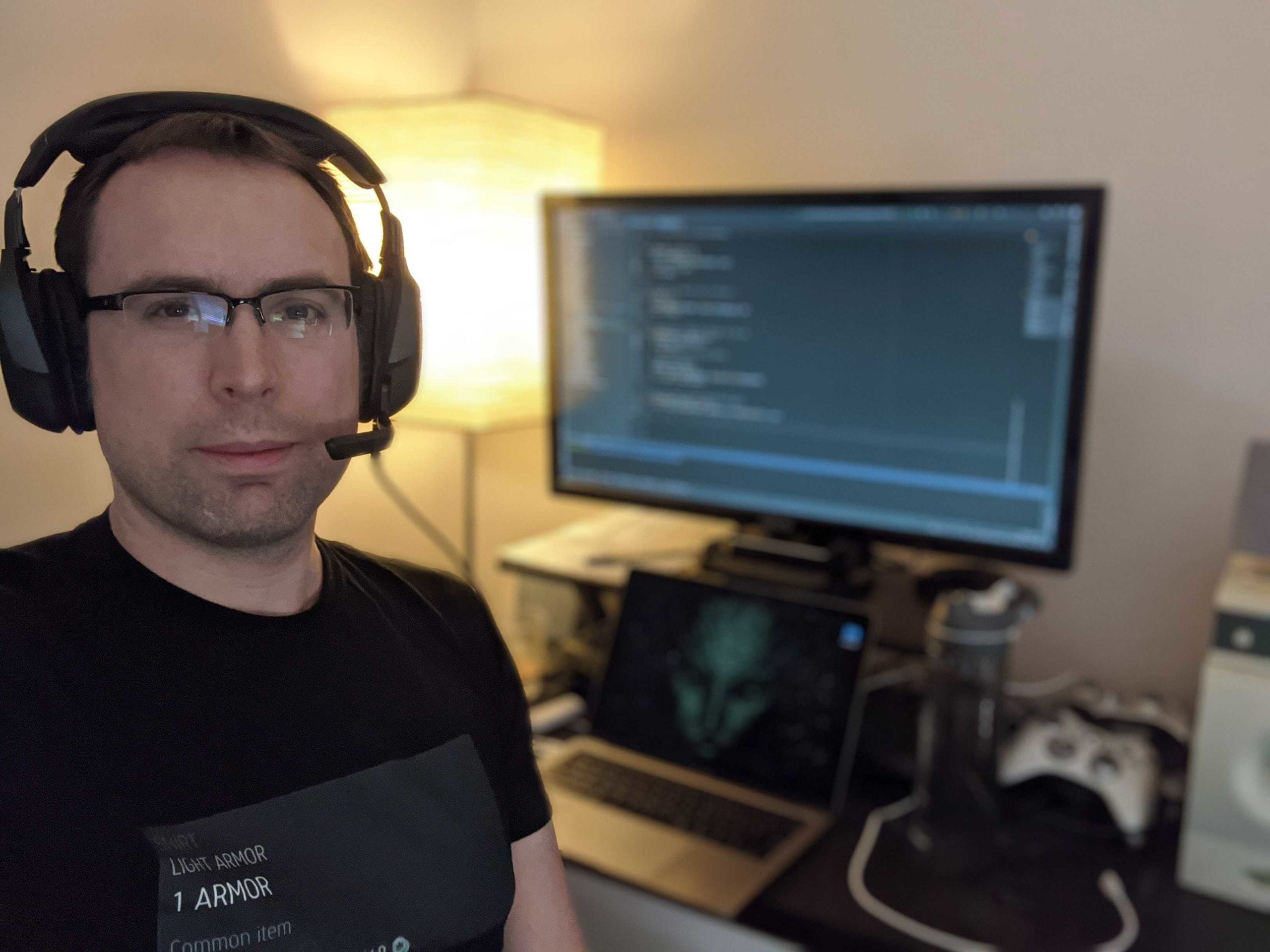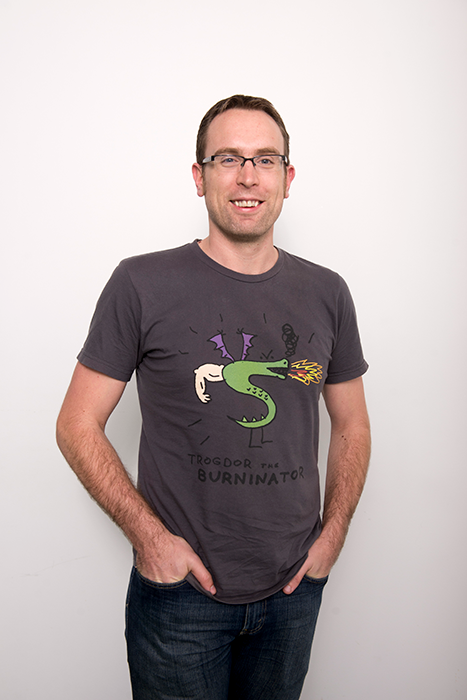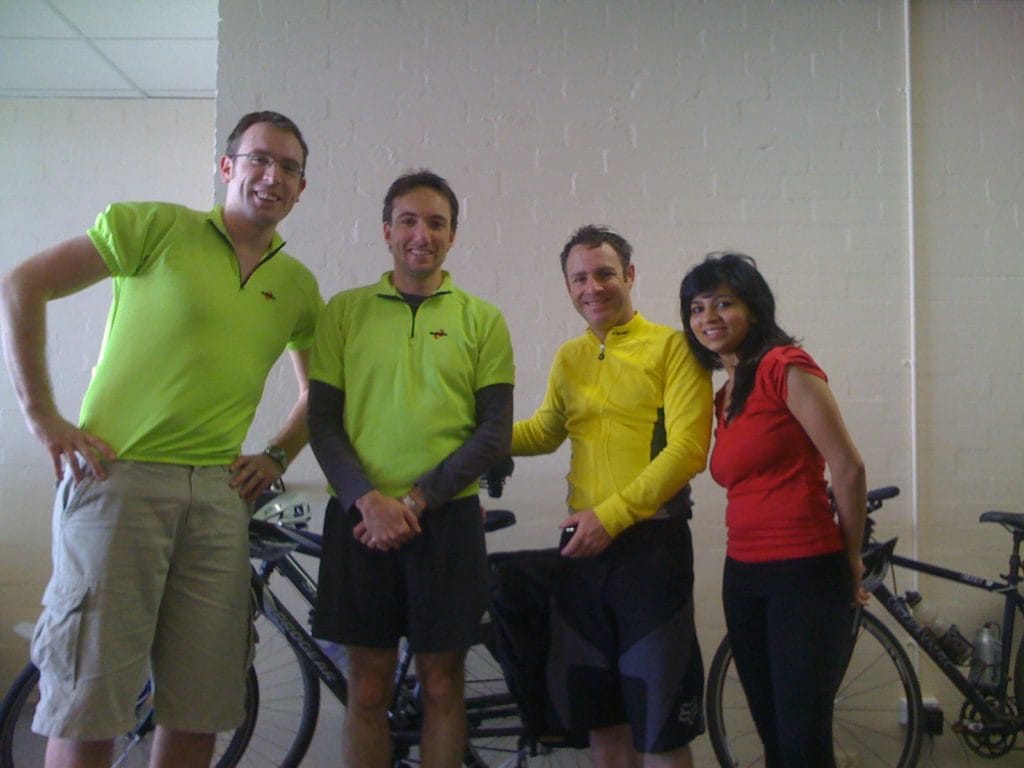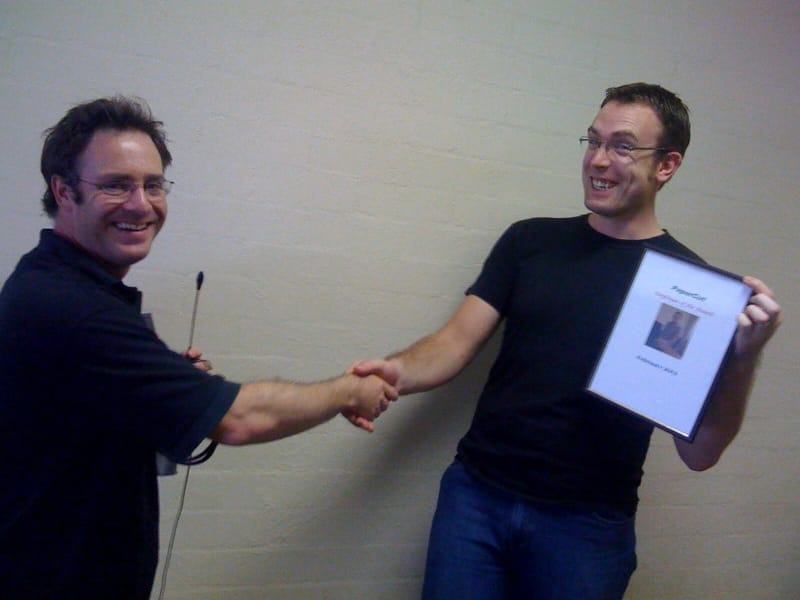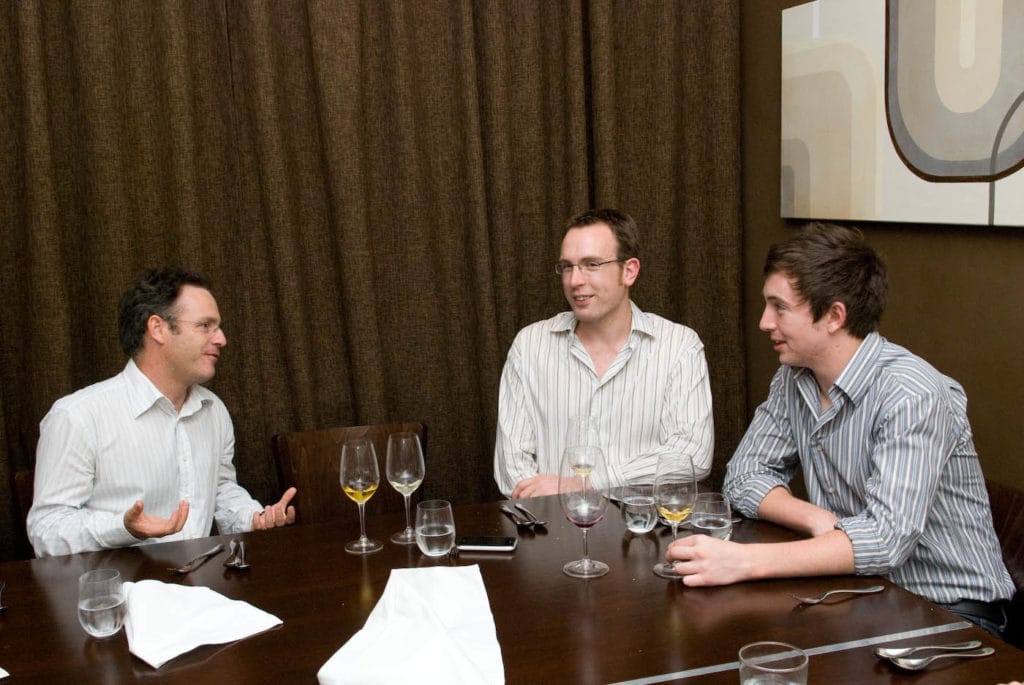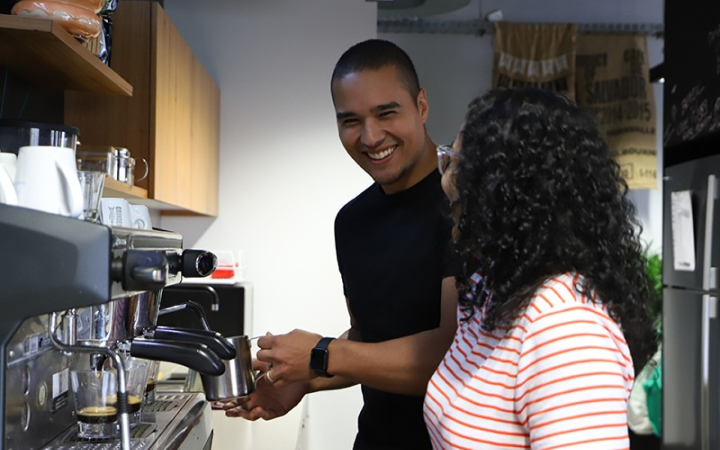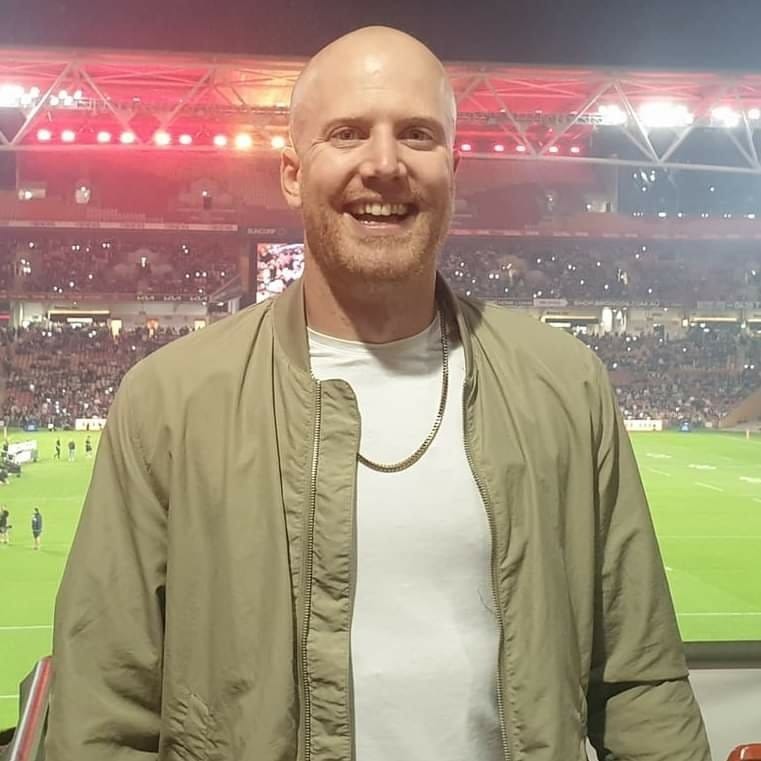Not every tech company employs 15-year-olds. Neither do we, I totally click-baited you with that title.
But it’s half true. We do have a 15-year-old PaperCutter. That is, we have a PaperCutter who has worked here for 15 of our total 23 (nearly 24) years.
His name is Tom Clift. He’s a Senior Principal Product Engineer. He’s actually our first employee!
Remember Trogdor?
Every month we honor PaperCutter anniversaries, and Tom recently celebrated his 15th year as a PaperCutter.
That’s a pretty good tenure when you consider [the average time spent at a job is 4.1 years](). So a decade and a half at one company is a heck of an achievement.
PaperCut commemorated Tom’s milestone in true PaperCut fashion: with an embarrassingly heartwarming video.
But I wanted to take the party (and embarrassment) one step further by sitting Tom down for a profile.
Which he somehow agreed to…
Kieron: Are you ready to feel old?
Tom: “(laughs) Yeah, alright…”
When you started at PaperCut, I was in my 11th/junior year at high school…
“Hey, come on! (laughs) I wasn’t too much past that! I was fresh out of uni, pretty much.”
That’s actually where I want to start. What’s the origin story that brought you to PaperCut?
“During uni, I took an internship at Sun Microsystems’ hardware division, they do software as well - they made Java. They later got acquired by a bigger company, Oracle.
“The big thing I learned was: I don’t want to work for a company that big. I was just a cog in the machine. I had no say about what went on.
“So I went back to finish uni, started an honors thesis. My research project was pretty rubbish (laughs) and they actually closed down my school - Network Computing - and made my thesis supervisor redundant. So I said, ‘Well, this is rubbish, and so’s my project, anyway. I’ll just look for a job.’
“And it just so happened that Matt and Chris [PaperCut’s founders] had posted a job to the Monash University Student Job Board…”
Were they looking for an intern, full time, part time, casual?
“It was a full-time software developer position. This was mid-year. So a lot of the intakes for the bigger companies were at the start of the year after students had finished their regular coursework. It was an unusual time to hire grads.
“What they were offering just sounded really interesting. Like, this was the days before ‘startup’ was a common term [the mid-2000s], but that’s clearly what it was.
“You could tell the difference in talking to them. Even just seeing the ad they’d posted. PaperCut was a true product development organization. They were building something exciting that people wanted to buy. They were obviously doing well at it because they were going to employ someone without investment.”
Going from a big company, to this “start-up”, PaperCut, in my mind, you meet Chris and Matt in a tiny garage, with an old dusty Mac in the corner…
“They’d moved out of their garage, and they had an office space. Because they wanted employees and they couldn’t have employees in their garage (laughs) - workplace safety and insurance and whatever.
“I thought it would be slicker than what it actually turned out to be. It was clear at the interview that PaperCut was just Chris and Matt.
“To be honest, I felt pretty confident because I thought I was good (laughs), based on my knowledge and experience. But I’d kind’ve changed… A couple of years before I thought computer hardware would be my thing. Then at some point, I thought computer security would be my thing. It was only, you know, just in the year or two before joining PaperCut that I’m like, ‘Actually, I quite enjoy development.’
“It was always something I hadn’t really gone too deep into. It wasn’t like I’d been programming, and knowing that I wanted a programming job, for a long time. It was kind of a new interest, even though I had been programming bits and pieces for years. Despite that, I was (laughs), perhaps, overconfident, in hindsight.”
Can you paint me a word picture of that interview?
“Finding the place was a bit hard. It was just a door on a street in Mount Waverley. It was in between, I think it was, a hairdresser and something random, at the time."
The first four PaperCutters at the first PaperCut office
Left to right: Tom Clift, Matt Doran, Chris Dance, and PaperCutter #2 Priyanka
“Whatever level they were on, there was, I think, a yoga studio on the right. Their space itself was kind of open plan, but it had these glass dividers between the sections. Behind one glass divider, there was nothing (laughs).
“It was, just, two desks, but it was like move-in day for them. They’d only been there a little while. When I entered and said my hellos, I think I was dressed in a cheap suit and these guys were wearing jeans and a shirt. That wasn’t something we’d really discussed (laughs).
“We sat down, with no desk to sit at. They just had their computer desks with their junk all over and there was no extra desk. We wheeled up into the skinny little room: three office chairs in the middle, next to a whiteboard.”
You touched on computer hardware, programming, software development. Had you thought about working with printers ahead of that interview?
“Not at all. But at the time, people printed more. In those days I was regularly printing: assignments, research papers, writing material for note-taking, etc.”
What was the first thing you worked on?
“There’s a developer mindset that domain expertise is less important than development skills. You just learn a domain and build what’s needed.
“Many developers miss the importance that deep domain knowledge can bring. They never get that career experience because they move between jobs every couple of years - just starting and finishing projects.
“I didn’t recognize this at the time, joining PaperCut, either. Throughout my years, I just always assumed there would be an end to it. With this print management product, surely at some point, it’s got enough features people want. Secure Print Release, and a couple of things, and then we’re done and we’ll do something else, right? But, obviously, it never ends.
“And the deeper you go, the more you realize there is to it. Because any particular customer you talk to, they don’t have all the context of print management. They’re just finding out about this. They have particular problems that they want to solve. But they don’t know the scope of the problem, either.
“We were, you know, the experts in what you can do and what’s possible. It wasn’t just development, the phone would ring and it could be a sales call or a support call. Or something completely random.
“Often support calls would turn into sales calls or vice versa. ‘Did you know you can install it right now? Okay, let’s try it out.’ What you think a support call would be. But, ‘Oh, you’re doing this other stuff, you want to purchase this other thing that we’re working on’. It would go back and forth like that. Having that domain expertise allowed those kinds of conversations to happen.”
Tom receiving one of PaperCut’s coveted Employee of the Month awards… they totally don’t happen every month
You’ve had a hand in a lot of our products, features, and solutions. What’s your Mount Rushmore/pool room/trophy collection of crowning achievements at PaperCut?
“Pwooooar…”
We’re into the deep questions now!
“Number one is meta… It’s the collection of all the small things that come together to create a consistent product experience. It’s a hundred things that we did, that required knowledge in how they work together so that you can present them in a way that makes sense.
“For some of the things like Secure Print Release , in particular, there’s a lot of thought that goes into how it interacts with 15 different areas of the system. You present this all together through 100 little projects that make it feel like a usable system.
“I think that shows through when customers/partners/resellers are installing it for the first time. It feels mostly intuitive. It shows them what they need. And if it doesn’t, there’s some documentation to help them.
“But big features, there was one recently with Mobility Print , our alternative to Google Cloud Print . We used some cool technology to develop Mobility Print. We used video chat technology, called [WebRTC]() (shout-out to PaperCutter Bez for the tip), to send print jobs, connect them from A to B, over the internet. Which is a cool thing to play with and get working. It was a bit of a technical achievement when we got the thing going.”
Chris regaling Tom Clift and former PaperCutter Will Rayner at the PaperCut Christmas party 2009
Speaking of crowning achievements, as I understand the story, you are both inadvertently and single-handedly responsible for PaperCut’s coffee culture…
“So, when I joined, Chris and Matt did a coffee run. Morning and afternoon. Downstairs, across the road, get some coffees.
“The workday was kind of structured around this coffee run:
“Come in. Answer all the support emails that had come in overnight. Done by 10.00 am. Have a coffee. Then the second run was around 4.00 pm. It was just an excuse for a routine change, a chance to chat. But often, you’d take the coffee to your desk and move on to the next task.
“As a lowly paid grad developer, two coffees a day adds up very quickly. I think it was probably like $2.50 AUD at the time.
“I wasn’t a coffee connoisseur, but I had an espresso machine at home. So it was cheaper for me to just make my own. Beans don’t cost all that much. I’d just make up a thermos of espresso and bring it in. When they had their coffees, I would just pull one out of my espresso mug, for like a fraction of the price. I think they looked at this and they’re like, ‘Oh, okay, look, we can pay for your coffee.’
“I think it helped Chris and Matt realize how they’d gone from a small business to a business that could afford to cover coffees for their staff. Because twice a day we’d be putting $2 coins each on the table, like friends splitting a pizza. They realized, ‘Oh, actually, look, business is booming, we’ll soon have more employees. We can afford some coffees.’
“It was getting serious. We started having petty cash. So the coffee runs were actually the beginning of our accounting system. Matt did the payroll back then and when you wanted a coffee, he’d give you some money. There was no office manager or accountant or anything like that then. So the coffee thing was the beginning of the evolution of the PaperCut finance system.”
All PaperCutters receive certified barista training… Neither of these PaperCutters are Tom
Time for the big question… why stay for 15 years?
“I think a big reason is that there were always more challenges to solve. I wasn’t finished. I was always keen to solve that next problem. I just didn’t see anywhere else where I could solve something as interesting.
“Now that I’ve got this domain knowledge and skills within the technologies that we’re using, that goes to the next problem. ‘Let’s keep going. Project after project kept on happening.
“We did Print archiving and the integration with the original Google Cloud Print. Things just kept on coming. I always appreciated just how much freedom we had to do things the way we wanted to do them.
One last thing, just to end on. In your blog bio you state that you always have headphones on in the office. You can see it in the Who broke the build? video. What were you actually listening to in that clip?
“That was all staged (laughs). But I would have been listening to mostly electronic music with a beat. Chiptunes, that kind of thing.
“Sometimes I’d listen to metal. I find anything with lyrics I can’t code to. It’s got to be no vocals. I’ve got a playlist called Music to Hack by, perhaps we can share that on the blog.”
